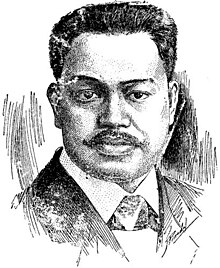Antonio Luna
General Antonio Luna y Novicio (born October 29, 1866 in Urbiztondo , Binondo , Manila , † June 5, 1899 ), General of the Philippine Army , pharmacologist, publicist and founder of the first Philippine military academy .
Life
Luna was the son of Joaquin Luna and his wife Laureana Novicio from Ilokos Norte. His older brother was the future painter Juan Luna . From 1876 Luna attended the Ateneo de Manila and graduated from this school in 1881 with the title of Baccalaureus in literature and chemistry. He then began to study pharmacy at the University of Santo Tomás .
During his studies Luna took part in a scientific competition with the essay Two Thorough Bodies of Chemistry and was awarded first prize for it. Luna later moved to Spain , where he traveled at the invitation of his brother, and studied there at the University of Barcelona . After obtaining a licentiate in pharmacy there, Luna moved to the University of Madrid . There he successfully completed his studies in 1890 with a doctorate in the same subject.
During the years of his stay in Spain, Luna began to publish various articles. Most of them appeared under the pseudonym Taga-ilog in the magazine La Solidaridad . He also soon joined reform-minded compatriots in Spain. In addition to his essays, he also wrote his first books, such as Impressions (about Spain) or Der Hauterreger der Malaria (scientific treatise).
Luna later stayed in Belgium and France , where he a. a. as an assistant to the professors Latteaux and shysters worked. In 1894 Luna returned to his native Philippines and in the same year got a job as a chemist with the government. After a short time, like Jose Rizal, he became one of the leading voices in the Philippine reform movement. The aim of this reform was the absolute equality of the Filipino citizens next to the Spanish and that the Philippines become a Spanish province.
In 1896 the Philippine Revolution broke out. Although Luna was not initially a revolutionary, his political activities led to charges of forming a terrorist group . The verdict in 1897 was deportation to Spain and 12 months imprisonment in the Carcel Modelo de Madrid . After serving this sentence, Luna went to Belgium. There he made the acquaintance of the future general Gérard Mathieu Léman , from whom he was instructed in military tactics and strategy . In 1898 he went back to the Philippines.
When the Philippine-American War broke out in 1899 , Luna took part in the fighting from the start. He showed himself to be a very capable general and was publicly praised by Emilio Aguinaldo and later promoted to general and chief of operational warfare. As such, he founded the Military Academy in Malolos . As trainers and instructors, he won many revolutionary officers. In several fights against the far better Americans he was able to prove his competence further, but had difficulties due to the indiscipline of some Filipino soldiers, among other things. With his hot-headed temperament and severity, he made a number of enemies. He even arrested some cabinet members after they planned to negotiate with the Americans. Once he even refused Aguinaldo his troops because he needed them for the front, which probably made him a potential rival for Aguinaldo.
On June 4, 1899, he was lured from Aguinaldo by a telegram to Cabanatuan . When Luna arrived at the monastery church the following day, only a few of Aguinaldo's officers were present. Having grown suspicious, Luna wanted to leave again, but was shot by these officers on the steps of the church. Rumors were spread that he was stabbed to death afterwards as well. On the same day, Luna was buried in the cemetery of this monastery.
After the murder, Aguinaldo initially closed the military academy, demoted the people of Luna and confiscated their weapons. With the death of Luna, the fate of the Philippine army was sealed, as it had lost one of its best strategists. Less than two years later, Aguinaldo and his troops surrendered to the Americans.
Works
- The hemorrhage causing malaria.
- Impressiones. Progreso tipografico, Madrid 1891.
Web links
| personal data | |
|---|---|
| SURNAME | Luna, Antonio |
| ALTERNATIVE NAMES | Luna, Antonio N. |
| BRIEF DESCRIPTION | General of the Philippine Army, pharmacologist, publicist |
| DATE OF BIRTH | October 29, 1866 |
| PLACE OF BIRTH | Urbiztondo , Binondo, Manila |
| DATE OF DEATH | June 5, 1899 |
